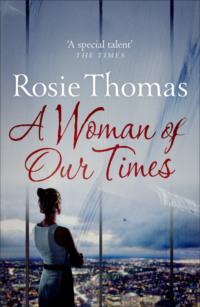
Полная версия
Constance

Constance
Rosie Thomas

Copyright
Published by HarperCollinsPublishers Ltd 1 London Bridge Street London SE1 9GF
www.harpercollins.co.uk
First published in Great Britain by HarperCollinsPublishers 2007
Copyright © Rosie Thomas 2007
Cover layout design © HarperCollinsPublishers Ltd 2016 Jacket photographs © Shutterstock.com
Rosie Thomas asserts the moral right to be identified as the author of this work.
A catalogue copy of this book is available from the British Library.
This novel is entirely a work of fiction. The names, characters and incidents portrayed in it are the work of the author’s imagination. Any resemblance to actual persons, living or dead, events or localities is entirely coincidental.
All rights reserved under International and Pan-American Copyright Conventions. By payment of the required fees, you have been granted the non-exclusive, non-transferable right to access and read the text of this e-book on screen. No part of this text may be reproduced, transmitted, down-loaded, decompiled, reverse engineered, or stored in or introduced into any information storage and retrieval system, in any form or by any means, whether electronic or mechanical, now known or hereinafter invented, without the express written permission of HarperCollins.
Source ISBN: 9780007173563
Ebook Edition © April 2016 ISBN: 9780007389551
Version: 2016-04-28
Praise
‘Her evocation…touches on the variances and nuances of love between men and women, and the power of family relationships to destroy lives’
ELIZABETH BUCHAN, Daily Mail
‘Thomas can write with ravishing sensuality’
KATE SAUNDERS, The Times
‘Rosie Thomas writes so beautifully about the feelings of people in war, the imminence of death and the importance of passionate and romantic love’
DAME TANNI GREY-THOMPSON
‘Honest and absorbing, Rosie Thomas mixes the bitter and the hopeful with the knowledge that the human heart is far more complicated than any rule suggests’
Mail on Sunday
‘Rosie Thomas writes with beautiful, effortless prose, and shows a rare compassion and a real understanding of the nature of love’
The Times
‘Thomas’s novels are beautifully written. This one is a treat’
Marie Claire
‘A terrific book, beautifully written…questions about identity, belonging, infidelity, dying and forgiveness make this a very moving study of the human heart’
Australian Women’s Weekly
‘A heart-rending story…exquisitely drawn’
Express
‘Thomas creates unforgettable characters and settings. She’s a superb writer’
Choice
‘Terrific…a real weepy’
Sunday Times
Dedication
For Cameron Mitchelson Bali
Contents
Cover
Title Page
Copyright
Praise
Dedication
PROLOGUE
ONE
TWO
THREE
FOUR
FIVE
SIX
SEVEN
EIGHT
NINE
TEN
ELEVEN
TWELVE
THIRTEEN
FOURTEEN
FIFTEEN
SIXTEEN
SEVENTEEN
Acknowledgements
Keep Reading: Daughter of the House
About the Author
Also by Rosie Thomas
About the Publisher
PROLOGUE London, June 1963
The boy and the girl were both just sixteen. It was nearly ten o’clock, which meant they would soon have to separate for a night and a whole day.
They crept down the empty street with their arms twined, he shortening his step to match hers and she resting her head on his shoulder. The overhanging plane trees made a tunnel of the pavement. The gardens on either side were dark recesses of rustling leaves, the territory of prowling cats and maybe a rat invading a dustbin. Under one of the trees the boy stopped walking. He hooked his arms round the girl’s shoulders and kissed her for the hundredth time. Her mouth felt bruised, but she kissed him back. His hands moved down to cover her breasts.
‘Mikey.’
‘I love you,’ he protested. His knee rubbed between her thighs and he heard the soft, enticing rasp her nylons made against his jeans.
‘Mikey. My dad said ten o’clock. You heard him.’
‘We’ve got ten minutes, then.’
He raised his head and glanced about. There was no one to be seen. This was a quiet road with only a few parked cars, and tall hedges screening the bay windows of the houses. Turn left at the end, and he reckoned it was a couple of minutes’ walk to Kathy’s house. If you ran.
He steered her towards the nearest gate. It stood open and a tiled path of coloured triangles and diamonds gleamed faintly in the darkness. No light showed behind the glass door panels, or in any of the windows.
‘Mike, we can’t,’ she murmured, but she came with him anyway.
Behind the hedge she pressed her mouth against his, teasing him with the sly curve of her smile. He answered by stroking his hand upwards from her knee. High up, his fingers met the smooth bulge of soft bare flesh above the stocking-top. They pressed into the vertical mattress of leaves, breathing into each other’s mouths, their tongues busy. The powerful, coarsely sweet smell of privet blossom flooded around them.
At first he thought the sound was a cat among the dustbins. It was a high-pitched cry, somewhere between a bleat and a howl. It stopped and then started again.
Kathy moved her head sideways. Her sweet spit smeared his lips.
‘What’s that?’ she breathed.
‘Some old cat.’
The cry came again.
‘It’s not. Listen, it sounds just like a baby.’
‘Don’t be soft. Come back here.’
‘Leave off. Where is it?’
She stooped down, her oval face and her pale cardigan a conjoined blur against the blackness. She pushed aside the lowest branches of the hedge and felt along the margin of dead leaves and blown litter underneath.
‘My God.’ Her voice turned high and sharp.
‘Shhh,’ he warned.
Kathy rocked back, almost tipping over her heels. She was lifting a bag in her two hands, a bag like the one his mother took to go to the shops, made of brown plastic that was supposed to be leather, with a zip and two upright looped handles. The mouth of the bag gaped open and the cat’s cry was much louder.
‘Look at this.’
He knelt beside her as she dipped her hands inside. He could smell dusty earth as well as privet.
‘Look,’ she breathed.
She was holding a small bundle of blanket. Between them they turned the folds aside and touched the baby’s tiny head. It was streaked with dark patches and waxy white stuff. Its mouth was open and its eyes screwed shut. Now that they saw it really was a baby, its crying sounded weak and nearly hopeless.
Mike was amazed. ‘What’s someone’s baby doing out here?’
With the baby cradled against her, Kathy glanced up at him. She looked serious, and wise, suddenly much older than a mere minute ago.
‘It’s abandoned. The mother’s left it because she can’t keep it. Probably no one knows she’s even had it. The poor thing.’
With the tip of her finger, Kathy stroked the baby’s cheek. Mike wasn’t sure whether poor thing meant the baby or its mother.
‘What’ll we do?’ He was deferring to her now, slightly in awe of her because she knew more than he did. She even knew how to lift and hold the baby close against her shoulder, with one hand cupping its head.
Businesslike, Kathy answered as she knelt and rocked the bundle, ‘We’ll have to call the police. And an ambulance.’
‘Well. Yeah. There’s a phone box up on Weir Road.’
‘We can’t go all the way up there. It’s an emergency. We’ll have to knock on someone’s door. Big houses like these, they’ve probably all got phones.’ She glanced up at the house, but there were still no lights. ‘Next door, there’s someone in. Go on, then.’
‘Just ring their bell, you mean, and say we’ve found a baby?’
‘Yes,’ she shouted at him.
A displeased man came to the door in his slippers, and behind him a woman in a nylon housecoat peered into the street. Mike had hardly finished his sentence before the woman brushed past both of them and ran round to the other garden. She reappeared with the brown bag in her hands, and with Kathy still cradling the baby. Kathy’s eyes were very bright and wide and there were ladders at both of her knees from where she had knelt in the gravel.
‘Graham, ring the police and say what’s happened. Come in here, love. Let’s have a look at the poor mite.’
The two women went into the front room and bent down together. They laid the baby on the cushions of the settee and unwrapped the blanket. The crying had stopped; now it just lay still. Underneath it was dressed in nothing but a tiny yellow cardigan and a dingy piece of towel secured with a safety pin. Its limbs were mottled and drawn up close to its body. The woman unpinned the improvised nappy.
‘It’s a little girl,’ Kathy whispered. Mike caught a glimpse of a thick purple-grey stump where its belly-button should be, and quickly looked away. There was an upright piano against the opposite wall, with framed photographs arranged on the lid. A picture of the Queen in a tiara and a blue sash and the Duke of Edinburgh in naval uniform hung above it.
‘What’s this?’ the woman said. She pointed, and Kathy saw the glint of something pinned to the blanket.
It was a little pendant of marcasites with a rod and a tiny screw fastening for a pierced ear.
‘It’s an earring.’
As she lifted it, Kathy’s eyes filled up with sudden hot tears.
Before she said goodbye, before she pushed the bag into the hedge, the baby’s mother must have fixed her earring to the blanket as a memento. Perhaps at this very minute she was holding its pair, and crying for her lost daughter.
It was the saddest thing Kathy had ever imagined.
The woman touched her shoulder.
‘You just don’t know, do you? About people’s lives?’
She hurried away and came back with a folded terry nappy and a white shawl.
‘I keep these here for when my Sandra brings her little one round. Mind you, she’s out of nappies now.’ Her tongue clicked. ‘Baby’s cold, isn’t she? Out in the night like that. Let’s get her wrapped up. I’m going to put the kettle on for a hot-water bottle, try to warm her up.’
‘I’ll hold her while you do it.’ Kathy was using a voice Mike hadn’t heard before. It didn’t allow for contradiction.
‘Slip her inside your cardie and hold her against your skin. You know, for body warmth.’
Her husband cleared his throat and looked away, and Mike studied the royal photograph more intently.
‘Police ought to be here any minute now,’ the man muttered. He went to the window and looped back the curtain so he could see into the street. Before the woman came back with the hot-water bottle, the blue light of a police car was flashing beyond the privet hedge. They heard the shrilling of an ambulance bell and then the room filled up with men in glinting uniforms. One of them took the baby out of Kathy’s arms and there was nothing left for her to do but watch as they prepared to take the baby away.
‘Well done, love,’ the ambulance man said to her. ‘The nurses will give her a bottle and warm her up and she’ll be as right as rain.’
A few minutes later, the ambulance had driven the baby away.
Kathy sat on the sofa with her knees and her ankles pressed very close together. She was shivering a little. Mike sat beside her and held her hand, but she didn’t seem to notice him.
The woman told her, ‘She’ll be fine, dear. You heard what the ambulance men said.’
Kathy nodded and stared at the floor. The brown bag along with the yellow cardigan, the blanket, the damp towel and the single earring lay at the policeman’s feet. With a cup of tea balanced on the arm of his chair, he was waiting to take their statements. His partner sat opposite them and their two caps were placed side by side on the piano stool.
‘We were just walking home from the pictures,’ Mike said.
‘You were walking past and you heard a cry?’
‘We weren’t walking. We’d stopped.’
‘On the pavement?’
‘Well, no. We’d gone into next-door’s garden. Just for a minute. Didn’t seem as though there was anyone in.’
The policeman looked at him. ‘Let’s see. You’d slipped behind the hedge for a kiss and a cuddle?’
Kathy blushed crimson.
Mike said, ‘No. Um, yes…’
‘It’s all right, son. It’s not against the law, David, is it?’
‘Wasn’t in my day.’ The other constable winked.
‘Did you see anyone?’
Kathy and Mike shook their heads. The street had been deserted, they were both sure of that. It had been so quiet, it was as if they were the only two people in the world.
‘Then we heard this crying. I thought it was a cat.’
‘I didn’t,’ Kathy said. ‘I knew what it was straight off.’ She chewed at the corner of her thumbnail. ‘Will you find her mother?’
‘We’ll do our best to get her to come forward. She’ll be needing medical attention, for one thing. That baby’s no more than a few hours old. But she’ll be running the risk of prosecution if she does, and that could mean up to five years in prison, depending on the circumstances. So they don’t often change their minds, in my experience.’
‘They? Not often?’ Kathy repeated.
‘It’s not quite the first time I’ve seen an abandoned newborn, let’s say.’ He put his pen away and looked at his watch. ‘That’s it, then. Back to work, Dave. Thanks for the cuppa.’
When Kathy heard it was ten past eleven her hands flew up to her mouth.
‘Oh no. My dad’ll kill me,’ she gasped. ‘My mum will be all right about it, though, when I tell her what’s happened.’
‘I’ll be there. I’ll make sure you don’t get into trouble,’ Mike said. But as Kathy turned her head to him he saw that there was a different look in her eyes. Something had changed tonight; she had seen something to do with the baby that he didn’t quite understand.
In a small, clear voice she said to him, ‘I’ll be fine. You just go back to your place.’
The policemen gave them a lift home. Kathy’s house was nearer and Mike waited in the back of the patrol car as she walked up to her front door with one of the policemen at her shoulder. Even in the dim light of the porch Mike could see how angry her dad was when he opened the door, but the sight of the policeman changed that. After a few words Kathy’s dad put his arm round her and led her inside.
She didn’t look back, and the door closed behind her.
At the Royal London Hospital, a paediatrician and a nurse finished their examination of the baby. The doctor filled in a form and signed it, then looked up at the nurse.
‘We’ll be needing a name.’
The nurse glanced at the reports that had come in with the ambulance crew.
‘A young couple found her, in a bag under a hedge. In Constance Crescent. I think that’s pretty.’
‘You can’t call a baby Constance Crescent.’
‘Constance, I mean.’
The doctor scribbled it down. ‘And the surname?’
The nurse glanced at the paperwork again. ‘The name of the young girl is Kathleen Merriwether.’
‘Constance Merriwether? That’s a bit of a mouthful.’ But he had already written it in the vacant space on the form.
‘If the mother doesn’t come forward in the next twenty-four hours, it’ll be a “Baby Constance” picture and story for the local rag,’ the nurse said.
The doctor sighed and took off his glasses.
Fed and washed, and dressed in clean clothes, the baby slept in her hospital crib.
ONE
Nights on the island were rarely silent.
The guttural scraping and grunting and booming that was the frog chorus could rise into a din sufficient to drown out all the other wildlife before fading away into a single disconsolate bleat. The many dogs who ranged the village streets barked incessantly, and in the small hours the roosters started up a brassy call and answer that lasted well into daylight. But towards dawn the world suddenly fell silent.
On this day the sky lightened from pitch black to a vast grey touched at the eastern rim with green, against which the coconut palms on the crown of the ridge stood out like paper silhouettes. In the waiting hush the light strengthened and the horizon flushed with pink and orange.
In a beautiful place, another lovely day was breaking.
Wayan Tupereme yawned at the door of his house and then shoved his feet into the brown plastic sandals that he had left neatly paired on the step. He made a brief circuit of his garden, nipping off a flower here and there and cupping the blooms in his left hand. By the time he was back at his door again, it was daylight. A little later he trod quietly down the dusty path beside the swathe of leathery leaves and twined stems that separated his garden from the Englishwoman’s, and strolled up to the next-door house. Even though the sun was rising there was no visible sign of life. He stooped to place something on the lower step of the deep veranda that ran all the way round the little single-storey house. It was a tiny basket woven from palm fronds and containing some squares of coarse leaf on which were laid an orange flower like a miniature sun, a scatter of scarlet petals, and a few grains of rice. Wayan touched his hands to his forehead, then stood up straight again and made his way back to his own house. He was getting old, and he walked slowly.
Ten minutes later, Connie’s alarm clock went off. She wasn’t used to waking to its shrill beep, and her arm thrashed as she tried to find the button to silence it. She extricated herself from the tangle of thin sheet and blinked at the time. It was six thirty. The car would be here to pick her up in half an hour but she lay still for a moment, letting the familiar outlines of the room and its furnishings reassemble themselves in the dim light. She had been dreaming, a thick coil of a dream that still clung to her although she couldn’t remember what it had been about.
‘Come on. Get going,’ she advised herself, once the chair and cupboard and the horizontal slits of pale light marking the shutter louvres were properly distinguished. She felt apprehensive, although not unpleasantly so, but there wasn’t time to dwell on any of that. The car was coming. There was a seven-thirty call.
The bedroom doors opened onto the veranda at the back of the house. As she did every morning, Connie opened them to let the light flood in, and stepped out into the air. It was still cool, with a faint breeze stirring the leaves of the banana palms. There was no pool, she had deliberately chosen not to have one, although the other Europeans who lived in the area all did. There was only the liquid music of water trickling down the rocks a little way off, and the view itself. It took her by surprise and then engrossed her, even after six years.
The house clung to the upper rim of a steep valley. From beneath her feet the ground fell away into the gorge and rose again on the opposite side, densely clothed in a tangle of trees, feathery leaves against broad blades against sharp spikes, a lush billow of textured greenery. The crowns of the highest coconut palms spread against the sky, three-dimensional in the brightening light. At the bottom of the cleft lay the river, a wide silver sweep with the morning mist rising from it. The cocks were still crowing, and as the warmth of the sun filtered through the leaves the first cricket started up its dry rasp. From the road on the other side of the house came the distant buzz of motorbikes as people headed for work.
Connie smiled at her view, thinking how lucky she was to have all this. She rocked on her bare feet, spreading her toes to connect with the warm, varnished boards. On an ordinary day she would have made tea and sat out here, gazing at the green wave until it was time to do something else. But today was not ordinary. The outside world had arrived.
She had laid out the shooting script the night before, her tape-recorder and her laptop and the sheets of music, even her clothes. All she had to do was shower and dress, make a last check and pack her bag.
At 7 a.m., still with a persistent flutter beneath her ribcage, Connie carried her bag out of the house. The offering placed by Wayan lay in front of the house temple, a little shrine sited at the appropriate corner of the veranda. She nodded her head to acknowledge it and then stepped past. The car was already waiting for her, pulled off the road into the grass and bare-earth space where the way to her house joined up with the path to Wayan’s. It was a big silver-grey Toyota 4x4, with tinted windows and enough room to seat seven people.
The driver leapt out as she emerged, and hurried to open the rear door for her.
‘Selamat pagi, ma’am,’ he said. ‘Good morning. All set now?’
Connie knew him quite well. His name was Kadek Daging and he was Wayan’s relative by marriage. Usually he worked in his small general store up in the main street of the village and was famous as a source of local gossip, but today he would have left one of his several sons in charge of the shop in order to undertake this important driving assignment for ‘the movie company’, as he put it. Actually it was less a movie than a trio of expensive thirty-second commercials for an online bank that were being shot on the island. But Connie didn’t want to diminish his sense of importance by making the distinction.
She would have shaken his hand, or even lightly touched his shoulder, but she took her cue from him and put the palms of her hands together to make a polite bow.
‘Good morning, Kadek. Thank you for coming.’
To preserve the formality of the occasion she climbed into the back of the car, even though she would have preferred to sit up front. Kadek jumped smartly into the driver’s seat and eased the Toyota out into the stream of scooters and motorcycles. One young man on a motorbike tried to race them, his blue shirt ballooning and his black hair raked back in the wind, but Kadek hooted and they sailed majestically past him.
Once they were established as the kings of the village traffic he asked over his shoulder, ‘Ma’am, would you care for a cold drink? A cool towel?’
Normally he would address her as ‘Ibu’, as he called all the other European women customers and neighbours, or ‘Ibu Con’ when he remembered, although Connie tried to persuade him to make it just ‘Con’. Today, however, they were in a different relationship.
‘Thank you,’ she said gravely.
‘In the box,’ he reminded her.
There was a cool-box in the foot-well, in which were bottles of water and soft drinks and a couple of rolled hand towels. Connie took out a towel and patted her hands and face with it, although she wasn’t hot. Kadek nodded with satisfaction at having done the right thing.









